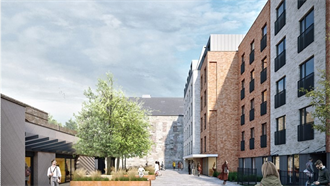Investor preferences are likely to continue to narrow post-pandemic, according to a panel of experts who convened in Hamburg to debate market dynamics in Europe.
The global pandemic’s acceleration of key structural trends is inspiring pan-European investors to focus on an increasingly select band of asset classes and regions, according to a roundtable hosted by PropertyEU in the German city of Hamburg.
A group of property investors, asset managers and developers convened at the headquarters of Garbe Industrial Real Estate with a view of Hamburg’s Hafencity, to metaphorically test for fair winds and discuss how to navigate the industry’s emergence from the health crisis.
The panel included Jan Philipp Daun, head of investment management at Garbe Industrial Real Estate; Björn Kombächer, head of investor relations at Engel & Völkers Asset Management; Rainer Nonnengässer, executive chairman of International Campus; and René Westerheider, head of asset management at Trei Real Estate.
Despite the experiences of a complex 18 months, the industry leaders identified a number of promising prospects in Europe, including rental apartments in Poland and the Netherlands with yields exceeding 5%, student housing in Central Europe, and logistics real estate in CEE. The panellists agreed that the European property market offers both security and opportunity.
Impressive yields in CEE
‘We earn higher returns in Poland than in Germany for the risks we are exposed to,’ suggested Westerheider of Trei Real Estate. A spin-off of the Tengelmann Group in Germany, the residential and retail-focused investor-developer is currently diversifying its business lines in Poland. Following the development of supermarkets and retail parks, Trei started on a build-to-sell residential drive three years ago. The Warsaw-based 50-strong team is now tackling the development of rental apartments. At mid-year 2021, the company had some €1.3 bn in assets under management, with its 147 properties in Poland accounting for 28% of the total.
Westerheider added: ‘We have a tangible portfolio in several Polish metropolises. We have projects in the pipeline, and initial talks with an Anglo-American investor are under way.
‘Most rental apartments are owned by municipal companies or private investors, and the majority of them date back to the Cold War era. They no longer meet the needs of a younger generation, whose outlook on life is more flexible.’ Trei is currently concentrating on the Big 5 cities of Warsaw, Wroclaw, Poznan, Krakow and Gdansk.
The search for suitable sites includes checking their own supermarket properties for development potential. ‘We demolish single-storey buildings and replace them with attractive properties featuring a supermarket and apartments on top. Sometimes, we will buy adjacent plots of land for extra space,’ Westerheider said.
Compared to the legal situation in Germany, Polish zoning law and landlord-tenant law are relatively attractive; but the housing market is under less pressure in Poland than in Germany. Trei targets institutional investors with its rental housing construction business. ’More aspects are left to market forces – not least because the rental market is less prominent in Polish politics. Gross initial yields exceed 5% in Warsaw, and go as high as 6% in Szczecin or Wroclaw.’
Netherlands proves green and profitable
Research suggests that the Netherlands will need around 1 million new apartments between now and 2030, making it an interesting market, according to Björn Kombächer of Engel & Völkers Asset Management. ‘Many investors who built up large property holdings in Germany are looking for ways to diversify – specifically for modern concepts that are sustainable and aligned with the urban requirements of tomorrow,’ Kombächer said.
‘A lot of investors expect me to offer them sustainability. They prioritise it over returns,’ he added, noting that the EVR Dutch Residential Fund 1 offers both, paying an internal rate of return (IRR) of around 5%. At the same time, it is structured to meet the requirements of an Article-8 fund under the EU’s Sustainable Finance Disclosure Regulation. ‘The Netherlands has made faster progress toward sustainability than Germany. The ESG criteria and the requirements of the EU taxonomy are new for many European players, yet the Netherlands are implementing them already.’
In this context, the EVR Dutch Residential Fund 1 invests in affordable new-build rental accommodation. The fund is a vehicle licensed in Luxembourg and administered by Hauck & Aufhäuser as an AIF management company. Kombächer said that the fund already has a secured pipeline. ‘It’s an important thing to point out. There are many investors who commit capital that is never drawn down. We, by contrast, can start building right away. The first seed capital has already been committed by an institutional German investor. We secured a new portfolio worth €600 mln whose development will start in 2022.’
Student housing coping well
‘This coming fall, student housing will emerge from beneath the shadow cast by Covid-19,’ remarked Rainer Nonnengässer of International Campus. ‘And the shadow was not nearly as dark as it was for other sectors. I’m not aware of anyone in the student housing sector whose occupancy rate dropped below 70%.’ He suggested that reports back in summer of 2020 of student bed and micro-apartment occupancy rates plummeting were exaggerated, although 50% of the first-semester students continued to live with their parents, the normal share being 20%.
Asked Westerheider: ‘We have a student hall of residence in our portfolio, located in Cologne-Ehrenfeld in Germany. Are there any differences in occupancy between small and large cities?’ Nonnengässer confirmed that there was a difference. He noted that enrolment declined in specialised higher education institutions – such as music academies or universities of technology with a foreign student share of 40% to 70%. ‘But that is now compensated by what appears to be a double cohort. For us, demand started to boom in late June.’
For this reason, Nonnengässer said he expected his units to be largely occupied by the autumn, and added: ‘The macro-data remain positive. Germany has a student population of 2.9 million. Out of these, 2 million require lodgings. But only 65,000 modern apartments and 200,000 units in student halls of residence are available in Germany.’
Logistics boom continues
The logistics boom started well before the pandemic, and was merely accelerated by the lockdowns, suggested Jan Philipp Daun of Garbe. But he warned: ‘Logistics is something no one wants around – more or less like cellphone towers. Logistics properties with their high space consumption, their presumably low-paid jobs and the massive traffic they generate, are not something municipalities are keen to have at their city gates. Yet we all appreciate having well stocked shops or – increasingly so – goods delivered directly to our doorsteps.’
He added that the logistics boom was clearly driven by e-commerce. ‘It took a short breather in the spring of 2020, but by May, at the latest, it was evident that logistics warehouses served as a hedge for the retail sector.’ Daun pointed to the dense network of fulfilment centres, distribution centres and last-mile facilities that Amazon, among others, has built up across Germany – not least with the help of Garbe – over the past five years. ‘Add to this that the German economy has learned how vulnerable its supply chains are. The realisation has already prompted an increase in warehouse stock.’
Generally speaking, warehouses in every logistics location are fully tenant-occupied. Demand for warehouse space cannot be fully met. Daun drew parallels between micro-living and logistics: ‘Just 10 years back, we were barely accepted as an asset class. Other issues that mattered for us were alternative use potential and funding – and just like with micro-apartments, the yield premium, which is tantamount to a risk mark-up, has seriously contracted in the meantime. Today, both seem to shine, having achieved price-to-rent ratios of 30.’
Polish retail parks attractive
Early on, Trei spotted a gap in the Polish market for retail parks. In 2021 alone, by year-end, the company will have opened seven new Vendo Parks, bringing the Trei portfolio up to 38 retail parks, with 28 in Poland and the others in Slovakia and the Czech Republic. ‘We are now even moving into cities with populations as low as 20,000 residents,’ said Westerheider, adding that retail structures in Poland tend to be dated, especially outside the major cities.
‘We initially underestimated the demand for modern retail units in small and mid-size cities,’ said Westerheider, noting that the situation in Poland is a far cry from the predatory competition in Germany. ‘Opening up a Vendo Park with six to eight stores here resembles a funfair. Even young people from the surrounding region will show up for the occasion.’
Trei’s original plan was to develop 50 Vendo Parks for its own portfolio, but that idea has now expanded to include third parties. ‘We will approach institutional investors to raise third-party funds, bringing our know-how and presence in the market to the table,’ he said.
Dutch apartment deficit
The housing market in the Netherlands differs fundamentally from that in Germany. More than half of all residential units are owner-occupied, and the privately financed rental housing market is rather small, while a large percentage of apartments are subject to rent control or are publicly subsidised.
As in Germany, the situation is defined by pent-up demand. The shortfall is expected to grow to around 400,000 apartments by 2024.
‘However’, said Kombächer, ‘the Dutch government introduced some quick and pragmatic solutions a few years ago to speed up housing construction’. The time between the planning application and the completion of an apartment now averages a maximum of 3.5 years.
The idea is to create 1,800 apartments in the Big 5 cities of the Randstad, the fourth-strongest economic region in Europe and home to 8.1 million residents. Some 65% will be destined for Amsterdam.
‘It was subject to much discussion: where should the fund be buying? But eight out of 10 investors said: Amsterdam is a must – even if returns are a bit on the modest side. Yet I find a cash yield of up to 4% to be quite fair,’ added Kombächer.
Aside from Amsterdam, developments in Rotterdam and The Hague, among other places, are earmarked for the fund. Nine out of 10 apartments are to be let for an initial rent below €1,000 a month, the so-called mid-price segment. Annual rent reviews follow the consumer price index – plus 1%.
Aiming for €1 bn by end 2022
Nonnengässer suggested a yield spread of 50 to 80 basis points between classic housing and micro-living – subject to a narrowing trend. ‘The fears of increased management and remodelling costs in the student housing segment have been dispelled by pricing it into the elevated rent. At the bottom line, the rent revenues are higher than from classic apartments, assuming a more or less normal year.’
International Campus plans to acquire assets worth €1 bn in Central Europe over the next two years to build up its proprietary portfolio, both in metropolises and in smaller campus towns. The firm has already invested €400 mln to date in 2021, but the year isn’t over yet.
‘We are growing exclusively on our own balance sheet now. Given our well-filled pipeline, it is reasonable to say we may almost double the amount invested before the end of the year. I generally have little doubt as to our ability to clear the €1 bn mark well before the end of 2022.’
What helps International Campus here is its pure-player approach and its experience. ‘We are very broadly positioned. In addition to buying a plot zoned for development and contracting to have it developed, we may opt for a forward funding model to buy from a third-party developer and put the scheme on the market in our own name,’ added Nonnengässer. Student housing has been warmly received by the market – and readily embraced by Anglo-Saxon investors who have been familiar with it for the past 30 years. ‘Many European and international investors have come to appreciate student housing as an attractive add-on option. The segment is no longer viewed as exotic – provided we are talking about residential rental business models,’ said Nonnengässer.
This year, logistics real estate specialist Garbe intends to raise €400 mln in equity to increase the investment amount earmarked for 2022, in consultation with its investors. Investments are planned to target the core-plus segment across Europe. The focus is backed by a survey that Garbe Research conducted on the rental performance in 30 European logistics markets between the second half of 2020 and 2021. Garbe measured the fastest growth in Slovakia at 8.9%, followed by France (6.25%), Austria (5.17%), Poland (4.76%), Belgium (4.26%), the Czech Republic (4.17%) and Germany (4.11%) between the first half of 2020 and mid-year 2021.
The company’s third institutional fund in the Glif+ series follows the same trajectory, being its first pan-European venture. ‘We secured a well-stocked seed pipeline worth €1.5 bn that gravitates toward the core segment,’ said Daun. ‘In addition to our German investors – which include superannuation schemes, pension funds, savings banks – we aim to bring international investors on board, such as French pension funds or Dutch insurance companies. The seed portfolio is very helpful when talking to investors, because you can refer to specific assets.’
Strong e-commerce dynamics in CEE
Garbe maintains a footprint in CEE with branch offices in Poland, Bratislava and Prague. In 2019, the firm also acquired the technical consulting and planning company Metroplan Eastern Europe.
‘These markets are interesting for us because they are busy catching up with the e-commerce development in Western Europe – and, of course, the gross initial yields are significantly higher here,’ observed Daun. For the new investment fund, he projected a rate of return between 4.5% and 6%, and added: ‘We are planning to go live in Q4 2021.’ A first property in Poland has already been acquired, while additional developments in Poland and Slovakia have commenced.


































